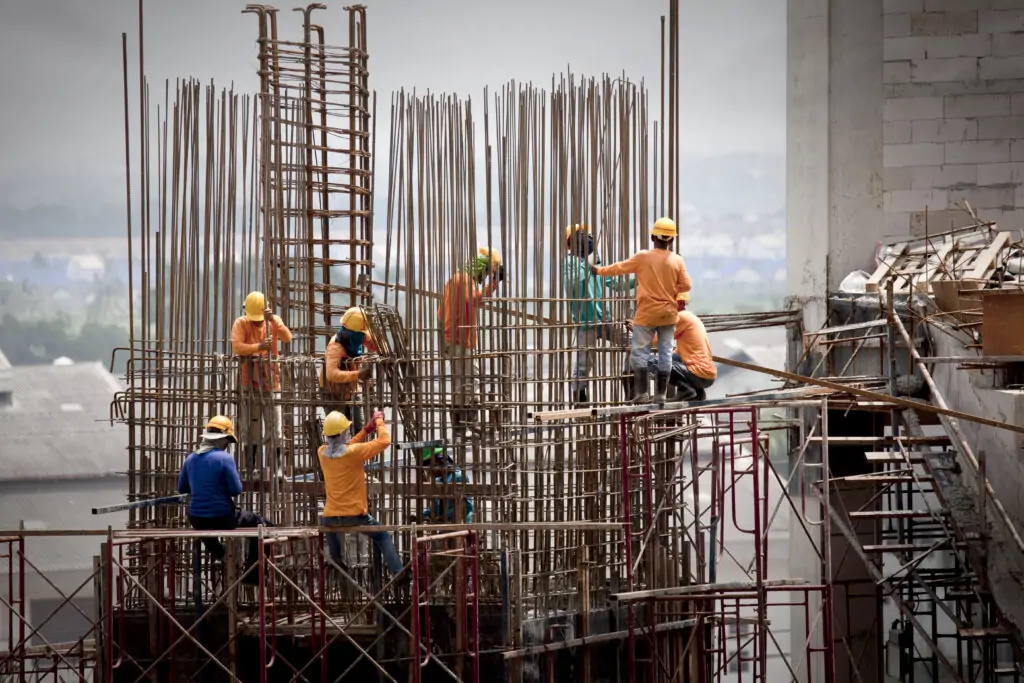
Commercial Construction Loans & Financing
Commercial construction loans are a type of financing that helps businesses cover the costs of constructing a new building or renovating existing commercial properties. These loans are typically short-term and can be instrumental in boosting business growth.
Commercial construction financing is different from traditional commercial mortgages. Where a standard commercial mortgage provides funds for buying or refinancing an existing property, a commercial construction loan is specifically for projects that involve construction or significant renovations. They are a crucial financial tool for businesses looking to expand their operations, renovate their premises or build a new commercial property.
How Does a Commercial Loan Work in the Construction Industry?
A commercial construction loan operates on a draw system, with funds disbursed as construction milestones are met. This approach ensures that the project is progressing as planned and helps manage the risk for both the lender and the borrower.
When a business applies for a loan for construction of commercial buildings, it provides the lender with a detailed business plan, including the construction budget, project timeline, and expected income from the completed property. Once approved, the loan doesn’t get disbursed in a lump sum. Instead, the funds are released in stages or “draws” as the project hits specific milestones. This could be after the completion of the foundation, framing, or other significant construction stages.
Each draw requires an inspection to ensure the project is on track. This method of disbursement helps manage the lender’s risk and also ensures that the borrower isn’t overborrowing or misusing the funds. It’s important to note that during the construction period, the borrower typically pays only the interest on the drawn amount. The principal repayment starts once the construction is complete and the loan gets converted into a traditional commercial mortgage.
Advantages of Acquiring Commercial Construction Loans
The benefits of getting a commercial construction loan include:
- Flexible Payments: During the construction phase, borrowers usually only pay interest on the amount drawn, easing cash flow pressure during this phase.
- Access to Large Funds: Commercial construction loans can provide substantial funds necessary for large-scale construction projects.
- Project Oversight: Lenders often require regular inspections before releasing funds, ensuring the project remains on track and within budget.
- Conversion to Traditional Mortgage: Once the construction is complete, these loans typically convert into a regular mortgage, offering long-term financing.
Commercial Construction Loans: Costs and Interest Rates
Understanding commercial construction loan interest rates and costs can provide a clearer picture of the overall expense of this financing option.
Construction loan fees and fixed costs include:
- Origination Fee: This is a fee charged by the lender for processing a new loan. It’s typically a percentage of the total loan amount.
- Inspection Fee: Given that lenders require regular inspections before releasing funds, inspection fees may also apply.
- Documentation Fee: Lenders may charge a fee for handling and processing the paperwork associated with the loan.
- Prepayment Penalty: If the loan is paid off before the end of its term, the lender may charge a prepayment penalty.
Commercial construction loan rates are typically higher than those for traditional commercial mortgages due to the increased risk associated with construction projects. The exact rate will depend on a variety of factors, including the borrower’s creditworthiness, the construction project’s viability, and the overall economic climate.
Discover the Types of Commercial Construction Loans
Different types of commercial construction loans cater to various project needs. These loans are offered by different lenders, have different qualification criteria, and each has its own advantages and disadvantages.
| Type of Loan | Key Features |
| Commercial Mortgage Backed Securities (CMBS) Loans | These loans are bundled with other mortgages and sold as securities on the open market. They typically offer competitive rates and long repayment terms. |
| Traditional Commercial Construction Loans | These are offered by banks and credit unions. They often require a significant down payment and have strict approval requirements, but offer competitive interest rates. |
| SBA 504 Loan | Provided by the Small Business Administration, these loans are designed to help small businesses. They require a lower down payment and offer long-term, fixed-rate financing. |
| Hard Money Loans | These are typically short-term loans with higher interest rates, used when a quick closing is necessary or when the borrower cannot qualify for a traditional loan. |
| Bridge Loans | These are short-term loans used to cover immediate costs, usually repaid or refinanced with longer-term financing. |
What Types of Properties Are Eligible for a Commercial Construction Loan?
Commercial construction loans can be used for a variety of property types, including:
- Office Buildings: From single-tenant buildings to large office complexes.
- Retail Spaces: This could include shopping centers, storefronts, or malls.
- Hotels: Both new constructions and renovations of existing hotels can be financed.
- Industrial Facilities: Such as warehouses, factories, or distribution centers.
- Multi-family Housing Units: Such as apartment buildings and condominiums.
- Special Purpose Properties: These include gas stations, car washes, self-storage, and more. Note that these properties may have additional requirements due to their specialized nature.
While construction loans are available for different types of properties, many lenders will specialize in underwriting specific property types. That’s why it’s a good idea for business owners to apply through National Business Funding. The company submits applications to over 75 different lenders to get the best rates and the highest probability of approval.
What Are the Qualification Requirements?
Requirements will vary from lender to lender and even for different projects and property types.
Solid Credit Score
680 FICO or higher
Strong Financial Statements
Personal and business financial statements
Down Payment
10% to 30%
Project Feasibility
Project plan, including budget, timeline, and expected cash flow
Commercial Construction Loan: Application Process
Here’s a general outline of the steps involved in applying for a commercial construction loan:
- Preliminary Meeting: Discuss your project with the lender to understand the loan options and requirements.
- Loan Application: Complete the lender’s application form, providing information about your business, the project, and your financial situation.
- Documentation Submission: Provide necessary documents, including business and personal financial statements, business plan, project plan, and other documentation requested by the lender.
- Loan Underwriting: The lender will assess your application and documents to decide whether to approve your loan.
- Loan Approval and Agreement: If approved, you’ll receive a loan offer outlining the terms and conditions of the loan. Once the agreement is signed, the loan process moves forward.
- Loan Disbursement: The loan funds are disbursed according to the agreed-upon schedule, typically in draws as various stages of the construction project are completed.
This process can be long, and to get the best rates and highest chances of approval, business owners will need to apply with multiple lenders. To save time and simplify the process, business owners can apply with National Business Capital (NBC) instead. NBC will shop your loan request out to over 75 lenders to determine the best fit and get you the best rate on your financing.
Explore Alternative Options to Commercial Construction Loans
While a commercial construction loan may be the best financing solution for many businesses, there are other options for businesses that need less capital, more flexibility, or looser underwriting criteria. Some of these financing options also complement a commercial construction loan, helping smooth over any gaps between draws.
| Alternative | Description | Best for |
| Business Line of Credit | A flexible financing option that allows businesses to draw funds as needed, up to a predetermined limit. | Businesses seeking flexible funding for a variety of expenses, not just construction. |
| Commercial Mortgage | A loan secured by commercial property, with funds typically used to purchase or renovate commercial real estate. | Businesses looking to purchase, renovate, or refinance an existing commercial property. |
| SBA 7(a) Loan | A government-backed loan with favorable terms for businesses, which can be used for various purposes, including construction. | Small businesses meeting SBA eligibility requirements and seeking lower rates and longer repayment terms. |
| Equipment Financing | A loan specifically for the purchase of equipment, where the purchased equipment serves as collateral. | Businesses needing to purchase expensive construction equipment. |
Frequently Asked Questions
How does a commercial construction loan differ from a residential construction loan?
Commercial construction loans are designed for the construction of commercial properties such as office buildings, shopping centers, or hotels, whereas residential construction loans are for the construction of residential properties, such as homes or apartment buildings. The qualification criteria, loan amounts, interest rates, and repayment terms may also vary between these two types of loans.
What is the loan-to-cost (LTC) ratio for commercial construction loans?
The loan-to-cost (LTC) ratio for commercial construction loans is a financial metric used by lenders to compare the loan amount to the total cost of the project. Most lenders typically require an LTC ratio of 80%, meaning the borrower must contribute at least 20% of the total project cost.
How is the loan disbursed during the construction process?
For commercial construction loans, funds are typically disbursed in stages or “draws” as the construction project progresses. Each draw corresponds to a specific phase of the project, such as site preparation, framing, or interior finishing.
How long does it take to get approved for a commercial construction loan?
The approval process for a commercial construction loan can vary widely, but typically it takes several weeks to a few months. This time frame includes the initial consultation, loan application, underwriting process, and final approval.


